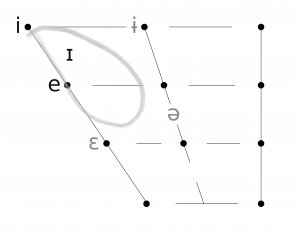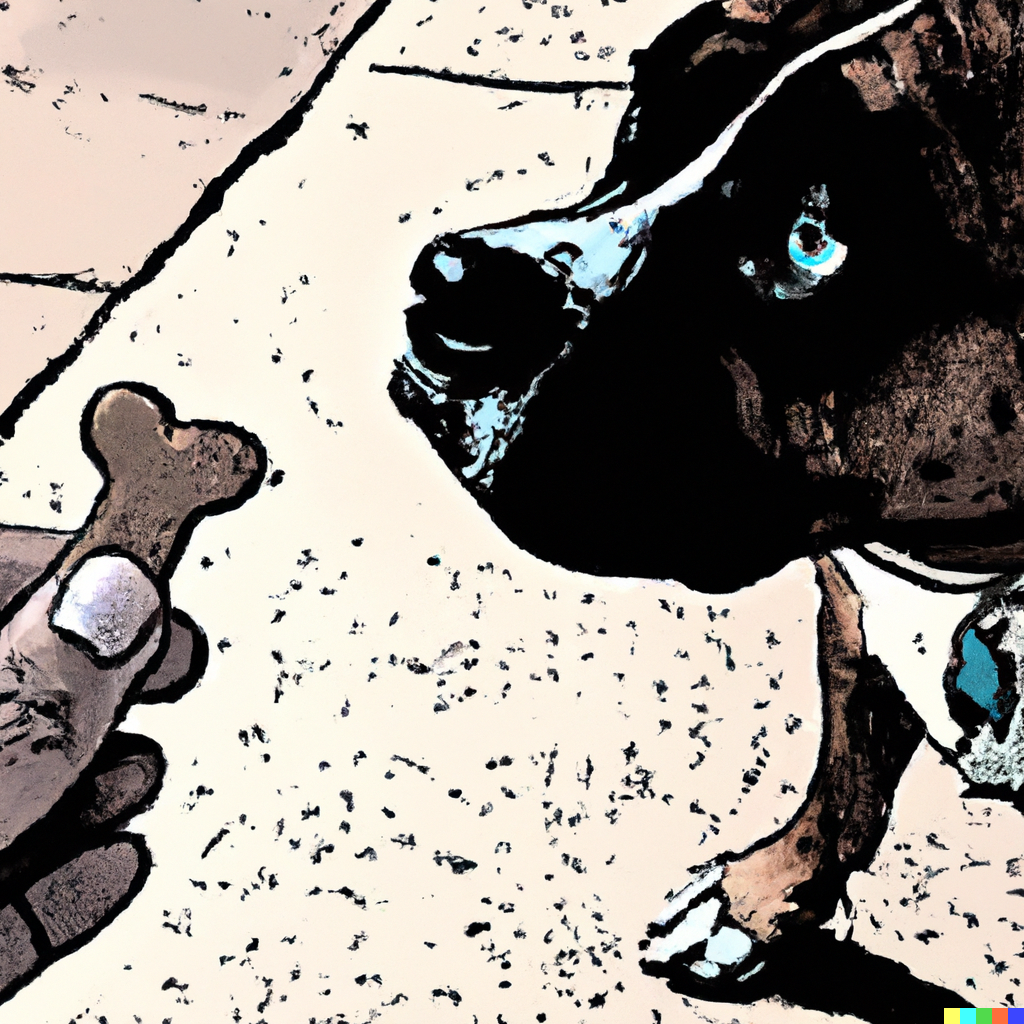25 The happY Lexical Set
 The happy lexical set is a part of the Weak Vowel group of sets that exist in unstressed, free syllables, most notably at the ends of words. Depending on the accent, happy can be associated with either fleece, kit, or face, with vowel qualities in the range of /i ~ ɪ ~ e ~ ɛ/. Appearing in about 4% of words, “y-endings” are an important part of English speech, and can be a helpful diagnositic in analyzing how to categorize or learn an accent accurately.
The happy lexical set is a part of the Weak Vowel group of sets that exist in unstressed, free syllables, most notably at the ends of words. Depending on the accent, happy can be associated with either fleece, kit, or face, with vowel qualities in the range of /i ~ ɪ ~ e ~ ɛ/. Appearing in about 4% of words, “y-endings” are an important part of English speech, and can be a helpful diagnositic in analyzing how to categorize or learn an accent accurately.
While most Lexical Set keywords are written in small caps, the keywords for the Weak Vowel group are set in lowercase, except for the last letters where the important syllable lies, e.g. happy, comma, letter.
- 🕊 Free: Can exist without a following consonant
 Weak: always in unstressed syllables
Weak: always in unstressed syllables
Spellings
Wells devised two sub-groups of the happy set, though the vowels of happy Ⓐ and Ⓑ match in all contemporary accents. The happy Ⓑ set features words that historically had the face vowel, though this is no longer the case. Compound words with -day, as heard in the days of the week and words like holiday or yesterday, show variability in different accents between the happy and face vowels.
| happy Ⓐ: | y#, ie#, i# | privacy, baby, boogie, movie, cookie |
| happy Ⓑ: | ee#, ey#, ea# | pedigree, coffee, money, valley, guinea, Chelsea |
Other less common spellings for happy Ⓐ include “algae, gimme, Raleigh, tidied, ratatouille, Albuquerque.”
Pronunciations
The happy lexical set is pronounced with a weak realization of the vowel of fleece, kit, face, or even dress, though phonologists frequently divide accents into three groups:
- a somewhat open, or lax happy vowel, generally around [ɪ]
- a more close or tense happy vowel, with [i]
- a very lax/open version of happy, with [e ~ ɛ].
“happy-tensing” is the term used by phonologists to describe the process by which accents that once used the open/“lax” vowel have evolved to use the more close or “tense” vowel for happy. Though happy has become more tense in the South of England—especially in contrast to historical [ɪ] in the high status accent known as Received Pronunciation (RP)—in places like Ireland, Australia and New Zealand, and most parts of North America where the higher, tenser form has always been the norm, the term is somewhat of a misnomer.
In the Central Belt of Scotland between Glasgow and Edinburgh, and in the North of England in places such as Lancashire, Yorkshire and Derbyshire[1], very lax pronunciations can range from [e] and even [ɛ]. The lax [ɪ] form can also be found in some varieties in the US South, and in parts of the Caribbean. Heightened forms of RP, such as those associated at one time with army officers, had a centralizing and/or opening effect on the kit version, sounding either like [ɛ] or even [ə].
In accents where there is an onglide on fleece, paired with the tense version of happy, we get the possibility of [ə̯i], especially in lengthened pronunciations as the end of an utterance. So “I’m happy about it,” would have [i], while “I’m feeling happy” would be [ə̯i].
As with all weak vowels, there is great variability within a speaker’s range of possible sounds, and context can certainly play a part. Some accents exhibit vowel harmony, where the ‑y ending tends to be closer when following a syllable with a close vowel, as in easy, than when it follows an open one, Aussie. When used in an unstressed syllable before a stressed vowel, prevocalic happy, as in react, or when the ‑ing suffix is attached, as in carrying, those with the more open [ɪ] pronunciation can switch to the more close [i] vowel. So someone who says [ˈkæɹɪ] might inflect the verb to [ˈkæɹi.ɪŋ]. Similarly, when the following word is a vowel, there may be a somewhat more energetically articulated happy vowel, as carry on: [kæɹi ˈɒn] or even [kæɹijˈɒn].
Actors working in historical drama exploring Original Pronunciation of Shakespeare and his contemporaries might encounter happy words rhyming with price, because, at that time, both sets could use [əi], such as when Oberon rhymes archery, gloriously, and remedy with die, eye, sky, and by in A Midsummer Night’s Dream: “Flower of this purple dye/ Hit with cupid’s archery.”[2]
Personal Pronunciation
 Where does your pronunciation lie, and how do you perceive it? Part of the difficulty in exploring your usage of an unstressed vowel is that as soon as you being to pay attention to it, to listen carefully to how you say it, you’re likely to change how you say it to a strong form. Due to this tendency, it can be very helpful to record your speech, and then listen back; slowing the recording down can be especially helpful in discerning the quality of a vowel like happy, as it goes by so quickly. [An application like the free app Audacity can be used to do this: select a portion of a waveform and then choose Effect>Change Tempo… ] A sentence like “I feel happy about this, happy that Eve is so funny,” would let you hear happy before a vowel, before a consonant, and at the end of an utterance, plus you’d have this and Eve to use for comparison.
Where does your pronunciation lie, and how do you perceive it? Part of the difficulty in exploring your usage of an unstressed vowel is that as soon as you being to pay attention to it, to listen carefully to how you say it, you’re likely to change how you say it to a strong form. Due to this tendency, it can be very helpful to record your speech, and then listen back; slowing the recording down can be especially helpful in discerning the quality of a vowel like happy, as it goes by so quickly. [An application like the free app Audacity can be used to do this: select a portion of a waveform and then choose Effect>Change Tempo… ] A sentence like “I feel happy about this, happy that Eve is so funny,” would let you hear happy before a vowel, before a consonant, and at the end of an utterance, plus you’d have this and Eve to use for comparison.
Experiment on your own or with a classmate, friend, coach or teacher to identify how your happy vowel compares with others. Without changing its stress or vowel quality, try extending the sound of your happy vowel, and then attempt to subtly shift it around in the vowel space—up, forwards, down, and back—in tiny increments. You should feel the top surface of your tongue moving towards/away from your alveolar (gum) ridge behind your upper front teeth; alternate that with moving it towards the middle of your mouth where schwa [ə] lives. What’s the smallest noticeable change that you can make?
Transcribing happy: Decide which vowel/diphthong symbol best suits your happy Lexical Set. Is it more close, similar to fleece [ i ], slightly open similar to kit [ ɪ ], or very open similar to face [ e ]?
If your happy vowel is… (use whichever vowel symbol is appropriate for you
- high, use the raised diacritic [ i̝ ], a small T pointing up
- open, use the lowered diacritic [ i̞ ], a small T pointing down
- pushed forward, use the advanced diacritic [ i̟ ], a tiny plus sign +
- pulled back, use the retracted diacritic [ i̠ ], a tiny minus sign –
- moved toward the middle of the mouth, towards schwa [ə], use the mid-centralized diacritic [ i̽ ], a tiny x-marks-the-spot above the symbol.
Alternate Pronunciations
Experiment with the Word Lists, Phrases and Sentences with the following vowels:
As you move the vowels in the directions recommended, see whether that modified oral posture might inspire you to move the articulation of consonants and other vowels in the word in similar ways. Does it remind you of another accent?
Word Lists for happy, sorted by the consonant that precedes it
KEY: All instances are unstressed.
PLOSIVES
p_
b_
t_
d_
k_
ɡ_
AFFRICATES
tʃ_
dʒ_
NASALS
m_
n_
ŋ_
FRICATIVES
θ_
ð_
f_
v_
s_
-z
ʃ_
-ʒ
APPROXIMANTS
ɹ_
l_
happy Before a Vowel
When happy occurs before a vowel, there is a tendency for it to be more close, moving from its primary articulation towards /i/. For example, if you have happy in the range of [ɪ], in this environment it may move to [i ~ i̽].
| happy | before a Vowel | |
| i | → | i̟ ~ i̝ |
| ɪ | → | i ~ i̽ |
| e | → | i̽ ~ ɪ |
+ kit
–ing endings:
+ near
+ face
+ dress
+ square
+ trap
+ bath
+ price
+ mouth
+ start
+ north/force
+ choice
+ goat
+ goose
+ cure
+ strut
+ nurse
+ comma
+ letter
Short Phrases
- My budgie Ritchie
- The Bangladeshi yogi
- Your date is trashy and nosey
- Stringy zucchini
- A baggie of veggies
- Cheeky monkey
- Is a rookie the same as a newbie?
- Give the doggie a bickie
- Tasty congee
- Very easy
- The dirty pig is very filthy
- Topsy turvy
- The foodie’s cookie recipe
- A runny and itchy nose
- Disney fairies in Pixie Hollow

Sentences
Level 1
Short with 2-3 words, underlined
- Don’t squeegee my Audi’s windshield!
- The taxi was pricey, not a freebee.
- Whitney ate sushi with Belushi.
- The golfer used a mashie to get out of the valley.
- He works locally, exclusively in the Okefenokee Swamp Park.
Level 2
Short with 4-5 words, underlined
- We will have two coffees and a toffee brownie.
- He took a lengthy journey to Tallahassee.
- Should Tommy and Becky really get married?
- Josie, do Reggie and Archie both like Betty, or Veronica?
- The Mummy was a silly movie that took itself too seriously.
Level 3
Medium with 3-4 words, not underlined
- Mommy said grandpa is stingy, and an old fogey.
- Melanie learned to play like Jimi at the guitar academy.
- That puffy coat is too pricey, Carrie.
- Julie flew to Bali for some sightseeing before marrying Diego.
- Akari served us teriyaki beef and sushi with wasabi and gari.
Level 4
Hard with 4-6 words, not underlined
- Marietta is emptying the pan of mushy macaroni into the compost.
- The pushy singers were bullying the woman who was accompanying them on piano.
- Sophie took a selfie with her buddy, Maggie.
- The yuppies played rugby while the hippies played frisbee.
- Herbie Hancock’s mom Winnie helped the prodigy get a gig with the Chicago symphony.
Mergers & Splits
Apart from the parallels to fleece, kit or face, there are no mergers or splits for the happy Lexical Set.
Review
A vowel that only occurs in unstressed syllables, and codas. As it can be in final position it is by nature "free," but it is unstressed. Generally these are happY, lettER, and commA, though some argue that some English varieties have a weak GOOSE vowel as well, which is sometimes dubbed "schwoo." The Alternative Lexical Set keyword for this is inTO.
Frequently, this is just another way of saying short, unstressed, or weak. The general idea is that these kinds of syllables require less effort, or muscular activity. The opposite of "tense."
Generally, another way of saying a strong, stressed, or long vowel. The opposite of "lax."Historically, it meant a more close articulation (so FLEECE is tense, while KIT is lax).
a glide into a diphthong. Frequently, a weak schwa-like sound, as the speak slides toward the nucleus of the vowel. The opposite of an "offglide".
A process where the quality of a vowel is changed so that it is more similar to another vowel in the same word.
Before a vowel. Sometimes interchangeable with the term "initial."

